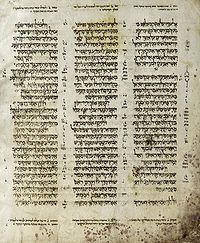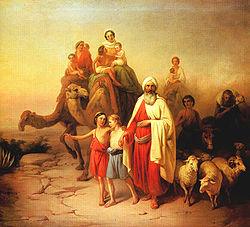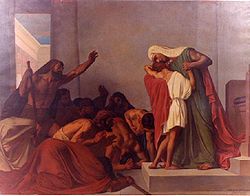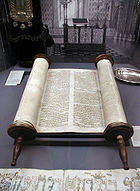- Book of Genesis
-
"The Book of Genesis" redirects here. For the band, see Genesis (band)."Gen." redirects here. For the military rank, see General officer.
The Book of Genesis (from the Latin Vulgate, in turn borrowed or transliterated from Greek γένεσις, meaning "origin"; Hebrew: בְּרֵאשִׁית, Bereʾšyt, "In [the] beginning"), is the first book of the Hebrew Bible and the Christian Old Testament.[1]
The basic storyline expresses the central theme of the book: God creates the world and appoints man as his regent, but man proves disobedient and God destroys his world through the Flood. The new post-Flood world is equally corrupt, but God does not destroy it, instead calling one man, Abraham, to be the seed of its salvation. At God's command Abraham descends from his home into the land of Canaan, given to him by God, where he dwells as a sojourner, as does his son Isaac and his grandson Jacob. Jacob's name is changed to Israel, and through the agency of his son Joseph, the children of Israel descend into Egypt, 70 people in all with their households, and God promises them a future of greatness. Genesis ends with Israel in Egypt, ready for the coming of Moses and the Exodus. The narrative is punctuated by a series of covenants with God, successively narrowing in scope from all mankind (the covenant with Noah) to a special relationship with one people alone (Abraham and his descendants through Isaac and Jacob).[2]
Tradition credits Moses as the author of Genesis, Exodus, Leviticus, Numbers and Deuteronomy, but the books are in fact anonymous and look back on Moses as a figure from the distant past;[3] some traditions contained in Genesis are as old as the United Monarchy, but modern scholars increasingly see it as a product of the 6th and 5th centuries BCE.[4]
The book describes its own structure around ten "toledot" sections (the "these are the generations of..." phrases), but many modern commentators see it in terms of a "primeval history" (chapters 1–11) and cycles of Patriarchal stories (chapters 12–50)—Abraham, Isaac, and Jacob (renamed Israel).[5]
For Jews and Christians alike, the theological importance of Genesis centers on the covenants linking the Lord (God) to his Chosen People and the people to the Promised Land. Christianity has interpreted Genesis as the prefiguration of certain cardinal Christian beliefs, primarily the need for salvation (the hope or assurance of all Christians) and the redemptive act of Christ on the Cross as the fulfillment of covenant promises as the Son of God.
Contents
Contents
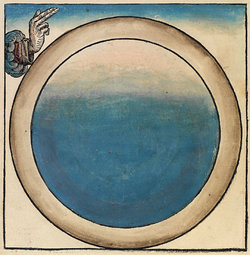 First Day of Creation (from the 1493 Nuremberg Chronicle)
First Day of Creation (from the 1493 Nuremberg Chronicle)
-
- Bereishit, on Genesis 1-6: Creation, Eden, Adam and Eve, Cain and Abel, Lamech, wickedness
- Noach, on Genesis 6-11: Noah’s Ark, the Flood, Noah’s drunkenness, the Tower of Babel
- Lech-Lecha, on Genesis 12-17: Abraham, Sarah, Lot, covenant, Hagar and Ishmael, circumcision
- Vayeira, on Genesis 18-22: Abraham's visitors, Sodomites, Lot’s visitors and flight, Hagar expelled, binding of Isaac
- Chayei Sarah, on Genesis 23-25: Sarah buried, Rebekah for Isaac
- Toledot, on Genesis 25-28: Esau and Jacob, Esau's birthright, Isaac’s blessing
- Vayetze, on Genesis 28-32: Jacob flees, Rachel, Leah, Laban, Jacob’s children and departure
- Vayishlach, on Genesis 32-36: Jacob’s reunion with Esau, the rape of Dinah
- Vayeshev, on Genesis 37-40: Joseph's dreams, coat, and slavery, Judah with Tamar, Joseph and Potiphar
- Miketz, on Genesis 41-44: Pharaoh’s dream, Joseph's in government, Joseph’s brothers visit Egypt
- Vayigash, on Genesis 44-47: Joseph reveals himself, Jacob moves to Egypt
- Vayechi, on Genesis 47-50: Jacob’s blessings, death of Jacob and of Joseph
Structure
Genesis appears to be structured around the recurring phrase elleh toledot, meaning "these are the generations." The first use of the phrase refers to the "generations of heaven and earth", and the remainder mark individuals - Noah, the "sons of Noah", Shem, etc., down to Jacob.[6] It is not clear, however, just what they meant to the original authors, and most modern commentators divide it into two parts based on subject matter, a "primeval history" (chapters 1-11) and a "patriarchal history" (chapters 12-50).[7] While the first is far shorter than the second, it sets out the basic themes and provides an interpretive key for understanding the entire book.[8] The "primeval history" has a symmetrical structure hinged around chapter 6-9, the flood story, with the events before the flood mirrored by the events after.[9] The "patriarchal history" recounts the events of the major patriarchs Abraham, Isaac and Jacob, to whom God reveals himself and to whom the promise of descendants and land is made, while the story of Joseph serves to take the Israelites into Egypt in preparation for the next book, Exodus.
Summary
God creates the world in six days and consecrates the seventh after giving mankind his first commandment: "be fruitful and multiply". God pronounces the world "very good", but it becomes corrupted by the sin of man and God sends a deluge (a great flood) to destroy it, saving only the righteous (Noah) and his family, from whose seed the world is repopulated. Man sins again, but God has promised that he will not destroy the world a second time with water.
God instructs Abram (the future Abraham) to travel from his home in Mesopotamia (modern Iraq) to the land of Canaan. There God makes a covenant with Abram promising that his descendants shall be as numerous as the stars in the heavens, but that they shall suffer oppression in a foreign land for four hundred years, after which they shall inherit the land "from the river of Egypt to the great river, the river Euphrates." Abram's name is changed to Abraham and that of his wife Sarai to Sarah, and circumcision of all males is instituted as the sign of the covenant.
Sarah is barren, and tells Abram to take her Egyptian handmaiden, Hagar, as a concubine. Through Hagar, Abraham becomes the father of Ishmael. Abraham asks God that Ishmael "might live in Thy sight," (that is, be favoured), but God replies that Sarah will bear a son, who will be named Isaac, through whom the covenant will be established. At Sarah's insistence Ishmael and his mother Hagar are driven out into the wilderness, but God saves them and promises to make Ishmael a great nation.
God resolves to destroy the city of Sodom for the sins of its people. Abraham protests that it is not just "to slay the righteous with the wicked," and asks if the whole city can be spared if even ten righteous men are found there. God replies: "For the sake of ten I will not destroy it." Abraham's nephew Lot is saved from the destruction of Sodom, and through incest with his daughters becomes the ancestor of the Moabites and Ammonites.
God tests Abraham by demanding that he sacrifice Isaac. As Abraham is about to lay the knife upon his son, God restrains him, promising him numberless descendants. On the death of Sarah, Abraham purchases Machpelah (modern Hebron) for a family tomb and sends his servant to Mesopotamia to find among his relations a wife for Isaac, and Rebekah is chosen. Other children are born to Abraham by another wife, Keturah, among whose descendants are the Midianites, and he dies in a prosperous old age and is buried in his tomb at Hebron.
Isaac's wife Rebekah is barren, but Isaac prays to God and she gives birth to the twins Esau, father of the Edomites, and Jacob. Through deception, Jacob becomes the heir instead of Esau and gains his father's blessing. He flees to his uncle where he prospers and earns his two wives. Jacob's name is changed to Israel, and by his wives Rachel and Leah and their handmaidens he has twelve sons, the ancestors of the twelve tribes of the Children of Israel.
Joseph, Jacob's favourite son, is sold into slavery in Egypt by his jealous brothers. But Joseph prospers, and when famine comes he brings his father and his brothers and their households, seventy persons in all, to Egypt, where Pharaoh assigns to them the land of Goshen. Jacob calls his sons to his bedside and reveals their future to them before he dies and is interred in the family tomb at Machpelah. Joseph lives to see his great-grandchildren, and on his death-bed he exhorts his brethren, if God should remember them and lead them out of the country, to take his bones with them. The book ends with Joseph's remains being "put in a coffin in Egypt."
Composition
For much of the 20th century most scholars agreed that the five books of the Pentateuch - Genesis, Exodus, Leviticus, Numbers and Deuteronomy - were made up of four sources, the Yahwist, the Elohist, the Deuteronomist and the Priestly source, each telling the same basic story, and joined together by various editors.[10] Since the 1970s there has been a revolution in scholarship: the Elohist source is now widely regarded as no more than a variation on the Yahwist, while the Priestly source is increasingly seen not as a document but as a body of revisions and expansions to the Yahwist (or "non-Priestly") material. (The Deuteronomistic source does not appear in Genesis).[11]
In composing the Patriarchal history the Yahwist drew on four separate blocks of traditional stories about Abraham, Jacob, Judah and Joseph, combining them with genealogies, itineraries and the "promise" theme to create a unified whole.[12] Similarly, when composing the "primeval history" he drew on Greek and Mesopotamian sources, editing and adding to them to create a unified work that fitted his own theological agenda.[13] The Yahwistic work was then revised and expanded into the final edition by the authors of the Priestly source.[14]
This leaves the question of when these works were created. Scholars in the first half of the 20th century came to the conclusion that the Yahwist was produced in the monarchic period, specifically at the court of Solomon, and the Priestly work in the middle of the 5th century (the author was even identified as Ezra), but more recent thinking is that the Yahwist was written either just before or during the Babylonian exile of the 6th century, and the Priestly final edition was made late in the Exilic period or soon after.[4]
As for why the book was created, a theory which has gained considerable interest, although still controversial is "Persian imperial authorisation". This proposes that the Persians, after their conquest of Babylon in 538 BCE, agreed to grant Jerusalem a large measure of local autonomy within the empire, but required the local authorities to produce a single law code accepted by the entire community. The two powerful groups making up the community - the priestly families who controlled the Temple and who traced their foundation-myth to Moses and the wilderness wanderings, and the major landowning families who made up the "elders" and who traced their own origins to Abraham, who had "given" them the land - were in conflict over many issues, and each had its own "history of origins", but the Persian promise of greatly increased local autonomy for all provided a powerful incentive to cooperate in producing a single text.[15]
Genre
Genesis is perhaps best seen as an example of "antiquarian history", a type of literature telling of the first appearance of humans, the stories of ancestors and heroes, and the origins of culture, cities and so forth.[16] The most notable examples are found in the work of Greek historians of the 6th century BC: their intention was to connect notable families of their own day to a distant and heroic past, and in doing so they did not distinguish between myth, legend, and what we would call facts.[17] Professor Jean-Louis Ska of the Pontifical Biblical Institute calls the basic rule of the antiquarian historian the "law of conservation": everything old is valuable, nothing is eliminated.[18] Ska also points out the purpose behind such antiquarian histories: antiquity is needed to prove the worth of Israel's traditions to the nations (the neighbours of the Jews in early Persian Palestine), and to reconcile and unite the various factions within Israel itself.[18]
Themes
Promises to the ancestors
In 1978 David Clines published his influential The Theme of the Pentateuch - influential because he was one of the first to take up the question of the theme of the entire five books. Cline's conclusion was that the overall theme is "the partial fulfillment - which implies also the partial nonfulfillment - of the promise to or blessing of the Patriarchs." (By calling the fulfillment "partial" Clines was drawing attention to the fact that at the end of Deuteronomy the people are still outside Canaan).[19]
The patriarchs, or ancestors, are Abraham, Isaac and Jacob, with their wives (Joseph is normally excluded).[20] Through the patriarchs God announces the election of Israel, meaning that he has chosen Israel to be his special people and committed himself to their future.[21] God tells the patriarchs that he will be faithful to their descendants (i.e. to Israel), and Israel is expected to have faith in God and his promise. ("Faith" in the context of Genesis and the Hebrew bible means agreement to the promissory relationship, not a body of belief).[22]
The promise itself has three parts: offspring, blessings, and land.[23] The fulfilment of the promise to each patriarch depends on having a male heir, and the story is constantly complicated by the fact that each prospective mother - Sarah, Rebekah and Rachel - is barren. The ancestors, however, retain their faith in God and God in each case gives a son - in Jacob's case, twelve sons, the foundation of the chosen Israelites. All three promises are more richly fulfilled in each succeeding generation, until through Joseph "all the world" is saved from famine,[24] and by bringing the children of Israel down to Egypt he becomes the means through which the promise can be fulfilled.[20]
God's chosen people
Scholars generally agree that the theme of divine promise unites the patriarchal cycles, but many scholars would dispute the idea that a single theme (or theology) runs through Genesis - a theology of the Abraham cycle or the Jacob cycle or the Joseph cycle might be possible, or a theology of the Yahwist or the Priestly source, but not a single theology or overarching theme for all of Genesis.[25] The problem lies in finding a way to unite the patriarchal theme of divine promise to the primeval history, with its theme of God's continuing mercy in the face of man's sinful nature.[26] One solution is to see the patriarchal stories as resulting from God's decision not to remain alienated from mankind:[26] God creates the world and mankind, mankind rebels, and God "elects" (chooses) Abraham.[2]
To this basic plot (which comes from the Yahwist) the Priestly source has added a series a covenants dividing history into stages, each with its own distinctive "sign". The first covenant is between God and all living creatures, and is marked by the sign of the rainbow; the second is with the descendants of Abraham (Ishmaelites and others as well as Israelites), and its sign is circumcision; and the last, which doesn't appear until the book of Exodus, is with Israel alone, and its sign is the Sabbath. Each covenant is mediated by a great leader (Noah, Abraham, Moses), and at each stage God progressively reveals himself by his name (Elohim with Noah, El Shaddai with Abraham, Yahweh with Moses).[2]
See also
Books of the Torah - Genesis
- Exodus
- Leviticus
- Numbers
- Deuteronomy
- Bible and history
- Biblical Patriarchs
- Creation according to Genesis
- Creation myth
- Covenant (biblical)
- Dating the Bible
- Mosaic authorship
- Paradise Lost
- Seven Laws of Noah
- Tanakh
- Weekly Torah portion
- Wife-sister narratives in Genesis
References
- ^ Hamilton (1990), p.1
- ^ a b c Bandstra (2004), pp.28-29
- ^ Van Seters (1998), p.5
- ^ a b Davies (1998), p.37
- ^ Kessler, Deurloo (2004), pp.3-7
- ^ Hamilton (1990), p.2
- ^ Whybray (1998), p.41
- ^ McKeown (2008), p.2
- ^ Walsh (2001), p.112
- ^ Gooder (2000), pp.12-14
- ^ Van Seters (2004), pp.30-86
- ^ Van Seters (1998), p.33
- ^ Van Seters (1992), pp.188-189
- ^ Van Seters (2004) p.114
- ^ Ska (2006), pp.169, 217-218
- ^ Van Seters (2004) pp.113-114
- ^ Whybray, p.39
- ^ a b Ska (2006), p.169
- ^ Clines (1997), p.30
- ^ a b Hamilton (1990), p.50
- ^ Brueggemann (2002), p.61
- ^ Brueggemann (2002), p.78
- ^ McKeown (2008), p.4
- ^ Wenham (2003), p.34
- ^ Hamilton (1990), pp.38-39
- ^ a b Kugler, Hartin (2009), p.9
Bibliography
Commentaries on Genesis
- Cotter, David W (2003). Genesis. Liturgical Press. http://books.google.com.au/books?id=6lCVzr4cT9QC&printsec=frontcover&dq=Genesis+David+W.+Cotter#v=onepage&q&f=false.
- Hamilton, Victor P (1990). The book of Genesis: chapters 1-17. Eerdmans. http://books.google.com.au/books?id=WW31E9Zt5-wC&pg=PR3&dq=Genesis&cad=3#v=onepage&q&f=false.
- Hamilton, Victor P (1995). The book of Genesis: chapters 18-50. Eerdmans. http://books.google.com.au/books?id=zlQ4chBCC5oC&pg=PA198&dq=The+book+of+Genesis:+chapters+1-17+Victor+P.+Hamilton#v=onepage&q&f=false.
- Kessler, Martin; Deurloo, Karel Adriaan (2004). A commentary on Genesis: the book of beginnings. Paulist Press. http://books.google.com.au/books?id=mBWeLCTgT0QC&printsec=frontcover&dq=A+commentary+on+Genesis:+the+book+of+beginnings+Martin+Kessler,+Karel+Adriaan+Deurloo#v=onepage&q&f=false.
- McKeown, James (2008). Genesis. Eerdmans. http://books.google.com.au/books?id=-gqTTl1iPr8C&printsec=frontcover&dq=Genesis+McKeown#v=onepage&q&f=false.
- Rogerson, John William (1991). Genesis 1-11. T&T Clark. http://books.google.com.au/books?id=EFle13pCS0wC&printsec=frontcover&dq=Genesis+1-11+John+William+Rogerson#v=onepage&q&f=false.
- Towner, Wayne Sibley (2001). Genesis. Westminster John Knox Press. http://books.google.com.au/books?id=6ONdsoa7MHUC&printsec=frontcover&dq=Genesis+Wayne+Sibley+Towner#v=onepage&q&f=false.
- Von Rad, Gerhard (1972). Genesis: A Commentary. Westminster John Knox Press. http://books.google.com.au/books?id=IbuBa8Qy3AwC&printsec=frontcover&dq=Genesis:+A+Commentary+Gerhard+Von+Rad#v=onepage&q&f=false.
- Wenham, Gordon (2003). "Genesis". In James D. G. Dunn, John William Rogerson. Eerdmans Bible Commentary. Eerdmans. http://books.google.com.au/books?id=2Vo-11umIZQC&pg=PA34&dq=Eerdmans+Genesis+his+rise+to+be+ruler+of+all+Egypt#v=onepage&q&f=false.
- Whybray, R.N (1998). "Genesis". In John Barton. Oxford Bible Commentary. Oxford University Press. http://books.google.com.au/books?id=3surkLVdw3UC&pg=PA38&dq=4.+Genesis+Whybray+Genesis+and+the+Pentateuch#v=onepage&q=4.%20Genesis%20Whybray%20Genesis%20and%20the%20Pentateuch&f=false.
General
- Bandstra, Barry L (2004). Reading the Old Testament: an introduction to the Hebrew Bible. Wadsworth. http://books.google.com.au/books?id=vRY9mTUZKJcC&pg=PA489&lpg=PA489&dq=Bandstra,+Barry+L+%282004%29.+Reading+the+Old+Testament:+an+introduction+to+the+Hebrew+Bible#v=onepage&q&f=false.
- Blenkinsopp, Joseph (2004). Treasures old and new: essays in the theology of the Pentateuch. Eerdmans. http://books.google.com.au/books?id=wq0YsOpTjKIC&printsec=frontcover&dq=Treasures+old+and+new:+essays+in+the+theology+of+the+Pentateuch#v=onepage&q&f=false.
- Brueggemann, Walter (2002). Reverberations of faith: a theological handbook of Old Testament themes. Westminster John Knox. http://books.google.com.au/books?id=dBJQ71RIpdMC&printsec=frontcover&dq=theological+handbook+of+Old+Testament+themes#v=onepage&q&f=false.
- Campbell, Antony F; O'Brien, Mark A (1993). Sources of the Pentateuch: texts, introductions, annotations. Fortress Press. http://books.google.com.au/books?id=cwhICpcHBsQC&pg=PR3&dq=Sources+of+the+bible&cad=3#v=onepage&q=Sources%20of%20the%20bible&f=false.
- Carr, David M (1996). Reading the fractures of Genesis. Westminster John Knox Press. http://books.google.com.au/books?id=8UJctZxFHikC&printsec=frontcover&dq=Reading+the+fractures+of+Genesis:+historical+and+literary+approaches#v=onepage&q&f=false.
- Clines, David A (1997). The theme of the Pentateuch. Sheffield Academic Press. http://books.google.com.au/books?id=Z45ullcFRG8C&printsec=frontcover&dq=Clines+Theme+of+the+Pentateuch#v=onepage&q&f=false.
- Davies, G.I (1998). "Introduction to the Pentateuch". In John Barton. Oxford Bible Commentary. Oxford University Press. http://books.google.com.au/books?id=3surkLVdw3UC&pg=PA12&dq=Oxford+Bible+Commentary+Introduction+to+the+Pentateuch#v=onepage&q=Oxford%20Bible%20Commentary%20Introduction%20to%20the%20Pentateuch&f=false.
- Gooder, Paula (2000). The Pentateuch: a story of beginnings. T&T Clark. http://books.google.com.au/books?id=49XpvvO-Oq0C&printsec=frontcover&dq=The+Pentateuch+Paula+Gooder#v=onepage&q&f=false.
- Kugler, Robert; Hartin, Patrick (2009). The Old Testament between theology and history: a critical survey. Eerdmans. http://books.google.com.au/books?id=L8WbXbPjxpoC&printsec=frontcover&dq=Robert+Kugler,+Patrick+Hartin#v=onepage&q&f=false.
- Levin, Christoph L (2005). The Old testament: a brief introduction. Princeton University Press. http://books.google.com.au/books?id=7geSuBAQ1e0C&printsec=frontcover&dq=The+Old+testament:+a+brief+introduction+Christoph+Levin#v=onepage&q&f=true.
- Longman, Tremper (2005). How to read Genesis. InterVarsity Press. http://books.google.com.au/books?id=SKEJ3kT7S2kC&printsec=frontcover&dq=How+to+read+Genesis+Tremper+Longman#v=onepage&q&f=false.
- McEntire, Mark (2008). Struggling with God: An Introduction to the Pentateuch. Mercer University Press. http://books.google.com/books?id=VwOs9f1FpmsC&pg=PA87&dq=william+propp+exodus+1-18#v=onepage&q=william%20propp%20exodus%201-18&f=false.
- Ska, Jean-Louis (2006). Introduction to reading the Pentateuch. Eisenbrauns. http://books.google.com.au/books?id=7cdy67ZvzdkC&printsec=frontcover&dq=Introduction+to+reading+the+Pentateuch+Jean+Louis+Ska#v=onepage&q&f=false.
- Van Seters, John (1992). Prologue to History: The Yahwist As Historian in Genesis. Westminster John Knox Press. http://www.google.ca/books?id=zRl8aj_KiM4C&printsec=frontcover#v=onepage&q&f=false.
- Van Seters, John (1998). "The Pentateuch". In Steven L. McKenzie, Matt Patrick Graham. The Hebrew Bible today: an introduction to critical issues. Westminster John Knox Press. http://books.google.com.au/books?id=owwhpmIVgSAC&printsec=frontcover&dq=The+Hebrew+Bible+today:+an+introduction+to+critical+issues#v=onepage&q&f=false.
- Van Seters, John (2004). The Pentateuch: a social-science commentary. Continuum International Publishing Group. http://books.google.com.au/books?id=T-Vi9eK_vS0C&pg=PA7&dq=Sources+of+the+bible&cad=3#v=onepage&q=Sources%20of%20the%20bible&f=false.
- Walsh, Jerome T (2001). Style and structure in Biblical Hebrew narrative. Liturgical Press. http://books.google.com.au/books?id=hGeXrcQTZ2kC&printsec=frontcover&dq=style+and+structure+in+biblical+hebrew+narrative#v=onepage&q&f=false.
External links
Part of a series on The Hebrew Bible
and DeuterocanonGenesis · Exodus · Leviticus · Numbers
Deuteronomy · Joshua · Judges · Ruth
1–2 Samuel · 1–2 Kings · 1–2 Chronicles
Ezra · Nehemiah · Esther · Job · Psalms
Proverbs · Ecclesiastes · Song of Songs
Isaiah · Jeremiah · Lamentations
Ezekiel · Daniel · Minor prophetsTobit · Judith · 1–2 Maccabees
Wisdom (of Solomon) · Sirach
Baruch · Letter of Jeremiah
Additions to Daniel / to Esther Bible portal
Bible portal- Book of Genesis illustrated
- Genesis Reading Room (Tyndale Seminary): online commentaries and monographs on Genesis.
- Bereshit with commentary in Hebrew
- בראשית Bereishit - Genesis (Hebrew - English at Mechon-Mamre.org)
- Genesis at Mechon-Mamre (Jewish Publication Society translation)
- Hebrew Audiobook of Genesis from Librivox
- Genesis (The Living Torah) Rabbi Aryeh Kaplan's translation and commentary at Ort.org
- Genesis (Judaica Press) at Chabad.org
- Young's Literal Translation (YLT)
- New International Version (NIV)
- Revised Standard Version (RSV)
- Westminster-Leningrad codex
- Aleppo Codex
Book of GenesisPreceded by
NoneHebrew Bible Succeeded by
ExodusChristian
Old TestamentBooks of the Bible Principal divisions Genesis · Exodus · Leviticus · Numbers · Deuteronomy · Joshua · Judges · Ruth · 1-2 Samuel · 1-2 Kings · 1-2 Chronicles · Ezra · Nehemiah · Esther · Job · Psalms · Proverbs · Ecclesiastes · Song · Isaiah · Jeremiah · Lamentations · Ezekiel · Daniel · Hosea · Joel · Amos · Obadiah · Jonah · Micah · Nahum · Habakkuk · Zephaniah · Haggai · Zechariah · Malachi
Orthodox1 Esdras · 2 Esdras · Prayer of Manasseh · Psalm 151 · 3 Maccabees · 4 Maccabees · Odes
Enoch · Jubilees · 1-3 Meqabyan · Paralipomena of Baruch
Matthew · Mark · Luke · John · Acts · Romans · 1 Corinthians · 2 Corinthians · Galatians · Ephesians · Philippians · Colossians · 1 Thessalonians · 2 Thessalonians · 1 Timothy · 2 Timothy · Titus · Philemon · Hebrews · James · 1 Peter · 2 Peter · 1 John · 2 John · 3 John · Jude · Revelation
Subdivisions Development Manuscripts See also Categories:- 1st-millennium BC books
- Historical documents
- Torah books
- Book of Genesis
- Creation myths
-
Wikimedia Foundation. 2010.

